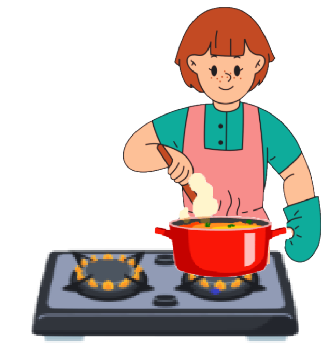Home Cooking: A Path to Healthier Eating
Cooking at home is more than just preparing meals; it is an investment in health, well-being, and social connections.
Research published in the Journal of Public Health Nutrition shows that individuals who cook dinner at home regularly tend to eat healthier meals and consume fewer calories compared to those relying on takeout or sugar, and sodium compared to restaurant meals or processed foods. The study also found that cooking at home six to seven nights a week helps maintain lower calorie intake even when dining out, proving the long-term benefits of home-cooked meals.
In contrast, the rise of the fast-eating trend, driven by fast food and ready-to-eat meals, has led to diets that increase the risk of weight gain, heart disease, and type 2 diabetes, particularly among men.

Health Benefits of Home Cooking:
Home cooking encourages the inclusion of a wide range of nutrient-dense foods in the daily diet. Research published in Nutrition Reviews indicates that individuals who rarely cook, particularly those living alone, often miss essential food groups such as fruits, vegetables, and fish.
-
✅ Better Calorie and Fat Control: Home-cooked meals are typically prepared with less unhealthy fat, sugar, and sodium compared to restaurant meals or processed foods.
-
✅ Nutrient-Rich Meals: Using fresh, whole ingredients ensures meals are packed with essential vitamins, minerals, and fiber for balanced nutrition.
-
✅ Hygiene and Food Safety: Proper handwashing, safe cooking temperatures, and avoiding cross-contamination reduce the risk of foodborne illnesses.
-
✅ Improved Digestion: Freshly prepared meals are easier to digest and enhance nutrient absorption.
-
✅ Reduced Risk of Chronic Diseases: A diet centered on home-cooked food is linked to a lower risk of obesity, type 2 diabetes, and cardiovascular disease.
-
✅ Better Weight Management: Control over portion sizes, ingredients, and calorie intake helps prevent overeating and supports healthy weight maintenance or weight loss.
Regular preparation of home-cooked meals helps maintain a balanced and diverse diet, supporting better overall nutrition.
Additional Health and Wellness Benefits
-
Mental Well-Being: Cooking at home is often a relaxing and therapeutic activity, boosting confidence, creativity, and overall mood.
-
Financial Savings: Preparing meals at home is generally more cost-effective than dining out, promoting both health and financial well-being.
-
Social and Emotional Well-Being: Developing new cooking skills enhances social interactions and fosters emotional well-being. Preparing meals together strengthens bonds between partners and turns meal preparation into a shared, enjoyable activity. Hosting friends or family for a home-cooked meal builds confidence and creates stronger social connections.
Learn Techniques Before Recipes
You do not need to be a chef to improve your skills in the kitchen. Focus on basic cooking techniques before moving on to complex recipes. Start with these essentials such as how to:
-
cut vegetables into cubes or julienne strips for salads and stir-fries.
-
make simple soups and salads, including homemade dressings.
-
cook whole grains like brown rice, quinoa, and farro as healthier starch alternatives to white bread, white rice, or potatoes.
-
fillet fish for fresh, lean protein options.
-
prepare lean proteins like chicken, fish, and tofu instead of relying heavily on red meat.
-
create healthier desserts with dark chocolate, nuts, and fruit, reducing your reliance on sugar-laden, high-fat options.
Practical Tips to Get Started
-
Create a menu of 5–6 easy meals using a simple combination of a starch, a protein, and a vegetable.
-
Choose recipes that don’t require exotic ingredients or time-consuming preparation.
-
Gradually experiment with new flavors and cooking styles to keep meals exciting and nutritious.
Bottom Line
Regular practice of preparing meals at home leads to healthier eating habits, improved well-being, and stronger social connections, while also offering the satisfaction and joy of creating meals from scratch.
Medical Disclaimer.
Read further on:
≺≺ Which food is most associated with helping people live longer?
≺≺ How important is fiber in the diet?
≺≺ What role do probiotics play in the diet?
≺≺ What Is the Ketogenic Diet? Is the Keto Diet Right for Everyone?
≺≺ What cardiovascular benefits do berries provide?
≺≺ What is the Okinawan diet? What is the secret behind Okinawan long life-expectancy?
≺≺ Ultra-Processed Foods: What They Are, Why They’re Harmful, and How to Cut Back.
≺≺ What grains have the lowest glycemic index?
≺≺ How Important Is Protein for Your Health?
≺≺ is your kid getting too much protein?
≺≺ What foods and vitamins are good for your skin?
≺≺ EWG’s- The Clean Fifteen: Fruits and Vegetables with the Lowest Pesticide Levels.
≺≺ What eating strategies work best for losing weight long term?
≺≺ How Do Sugary Meals and Beverages Harm Dental Health?
≺≺ Why Vitamin B12 Is Important for Your Health?
≺≺ What foods should people with high blood pressure avoid?
≺≺ What are the top three minerals you can take to boost memory?
≺≺ Why is regular table salt considered unhealthy?
≺≺ What food is most effective for moderating blood sugar?
≺≺ What are antioxidants? How antioxidants in the fruits and vegetables help in preventing cancers and diseases?
≺≺ How can I reduce the risk of cancer-causing chemicals when cooking or grilling meat?
≺≺ What happens to my blood vessels when I gain weight?
≻≻ Watch this page for more such informative articles on Health, Nutrition, and Wellness.
≻≻-Back to Home page.
Further reading (External Links opens in new window):
≺≺- Harvard Health Publishing – Home cooking: Good for your health.
≺≺- Harvard Health Publishing – Why Cooking at Home is the Key to a Healthier Lifestyle.

